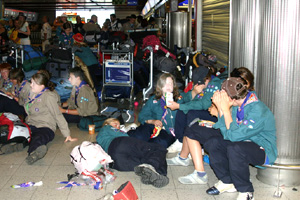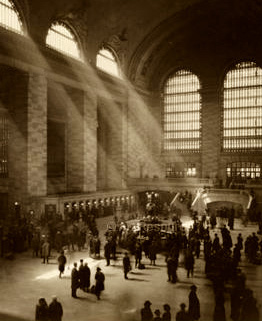 |
Formation of Children
Traveling
Marian T. Horvat, Ph.D.
As a young man matures, he will encounter occasions when he will be taking trips by bus, train or plane. The manners of a well-bred youth are an integral part of him, and will be the same whether he is in his family automobile or on a trans-continental flight to France. One whose manners are only assumed in company is a veneered Catholic gentleman, not a real one.
Dressing appropriately
It is quite agreeable to travel with courteous and civil companions. On trips one should dress with appropriate decorum, decency and tidiness. It is a duty of charity not only toward the persons with whom you travel or encounter, but also a duty toward yourself because a man is judged by his clothing, especially on travels.

Today it is common to find scenes like this in airport waiting rooms: the despotism of the casual |
Not so long ago, this rule was generally followed. Airports and train and bus stations were peopled with men in suits and women in dignified travel attire. Today, the trend toward the casual and vulgar is dominating everywhere. Decency and aesthetics are no longer criteria for dress; the only important thing is to be comfortable. So, we see persons of all levels in society dressed in sloppy and even indecent clothing, sitting cross-legged or lounging on floors. The counter-revolutionary Catholic does not join this general leveling down in society, but sets a higher standard by presenting himself well.
Likewise, he takes care that his luggage and carry-ons are neat and arranged in an orderly way. Nothing gives a worse impression that broken-down bags, or papers and packages falling out of carry-ons.
Other means of travelling
Despite the pleasure that traveling by plane, train, subway or bus may gives, it generally imposes a series of sacrifices. In them, a man of poorly formed character reveals himself to the eyes of all. It is not agreeable for anyone to travel with rude and egotistic persons, or those endowed with great touchiness and nervousness. Shortly one knows the degree of culture of a fellow traveler, be it by his temper, his fastidiousness or the rusticity of ways.

A youth in appropriate dress waits at an airport |
In fact, every trip of some length will reveal the defects of the egotistical, demanding, discourteous, vain or ill-tempered young man, because a long trip is accompanied by inevitable inconveniences and unforeseen circumstances.
The variety of the countryside, the novelty of the natural beauty, the comfort of the vehicles do not prevent the inconveniences found in travels: unexpected delays and accidents, bad weather, dirty or poor accommodations, impertinent maids, bad restaurants, noisy or disagreeable fellow passengers, excessive heat or coldness, the odor of certain persons with poor hygiene, the rain, etc.
The amiable and cultured passenger supports these disagreeable elements of travel without manifesting annoyance, complaints or murmurings. He does not give way to his impulses nor burden his companions with outbursts of bad humor. In truth, when traveling we can often witness actual ferocity in defense of places to sit and commodities. How far this is from the forgotten law of courtesy.
The well-educated passenger will observe the following rules when traveling by land or air:
- He respects the reserve of others, and at the same time asks that others respect his. After exchanging greetings with a seatmate, if he prefers not to speak, he picks up a book or newspaper, politely indicating the conversation is ended. If the fellow traveler is persistent, he may say, “I’ m sorry, but I prefer not to talk right now. I have some reading to do.”
- He will not open or close the lights or window before asking his neighbors if is convenient for them.
- Upon arriving at his destination, he will salute his neighboring companions with a quick gesture of acknowledgement.
- He will not put his luggage and packages in places that do not correspond to his place.
- If another passenger is collecting his baggage, he will facilitate the work, assisting him or moving his own things if they are in the way.
- He is considerate of the small amount of space assigned to each passenger in most airplanes, and does not take the whole armrest for himself.
- He does not bring strong-smelling food on board that fill the air around him with pungent or acrid smells. Nor does he remove his shoes and subject fellow travelers to foot odor.
- He will not become difficult, overbearing or sarcastic in his tone of conversion with other passengers.
- Should delays or inconveniences arise, he will avoid criticizing the authorities, berating the travel company, or putting the blame on some particular employee or person.
The correct behavior

In a calmer era, early morning light streams through windows of the Grand Central Station in New York |
For an intelligent young man, the most perfect way to travel is to enter into the quiet reading of a good book or magazine. At the beginning of the trip, the Catholic crosses himself, raises his heart to God and commends his trip to his Guardian Angel. He thinks of the friends or family whom he is leaving and those he is going to meet.
During the trip, he will be composed, amiable and helpful. If the trip involves meals or a stay in a hotel, he practices both the patience and the good manners that are natural to him. He will avoid impertinent remarks to the waitresses and maids, or causing brawls with his travel companions.
While everyone prizes the polite manner and gentility of character of the well-bred, considerate young man, no one likes the company of an egoist, above all on trips. The egoistical passenger is a whip for his companions. He pushes everyone aside in lines. He fusses with his bags and packages as others wait. He occupies his place as if he were traveling alone, having no consideration for others. He takes possession of his seat like a prisoner assigned to a cell. He does not rise for ladies, the elderly, the handicapped, the sick or children except when he is forced to do so. In short, he does not try to accommodate anyone. He is immersed in himself and his own conveniences, which he exaggerates in his mind.
In hotels
In hotels, the egoistical traveler imagines himself the center of the world. He constantly complains at the desk over the smallest matters and makes special demands beyond the ordinary. In the lobby, he calls out to his friends from across the room and feels free to enter into the conversations of everyone. In the hotel restaurant, he makes loud disparaging remarks about the dishes, he complains at the service, he opens his mouth to clean his teeth, he belches when he drinks, he clicks his teeth on the silverware, he wipes his face with the napkin, in short, he steps on all the rules of good manners.
The braggart fools no one but himself

Avoid the vulgar and clownish dress of the stereotype American tourist |
It is a torture on a trip to find oneself seated next to the vain, presumptuous, and arrogant loud mouth, eager to talk about himself and everything he owns or has accomplished in life. The braggart employs every stratagem to be admired and praised. Simultaneously, he has nothing but complaints about others.
Often he is also a liar, telling a fantastic story of accomplishments he has not accomplished, a prodigious wealth and family possessions he does not possess. In his tiresome tale, he overwhelmed all his teachers with his brilliance, passed every examination with flying colors, knows the great hotels of the principal capitals of the world, won elections against formidable adversaries, or carried out confidential assignments of utmost importance. He is the friend of ministers and diplomats, or perhaps celebrities and movie stars. His automobiles and electronic gadgets are all the latest and best models.
But no one believes what he says. The Catholic gentleman avoids this kind of behavior and always obeys the precepts of courtesy – above all on trips. He gives good example. He is prudent, reserved, discreet, honest, and helpful. He knows that the well-bred man never makes a display of his money or possessions, or discusses his personal finances or private family affairs with others. Only a vulgar braggart speaks about how much this or that cost him.
Fulfillment of religious duties
The Catholic young man does not fear to carry out his religious duties when he travels.
At the beginning of an airplane trip, he will say his travel prayers, asking Our Lady and his guardian angel to protect him and see him safely to his destination. He does not omit his prayers before and after meals served during the trip.
He also does not have human respect to take his Rosary out of his pocket to silently pray it.
Today in our secular and vulgar environments, it can take courage for a young man to make these small religious gestures. Such acts reveal a man of character who fears and loves God more than the fickle and always-shifting opinion of man.
Examples
Feeling that the end of his pilgrimage on this earth was approaching, the elder Tobias asked his son, the young Tobias, to undertake a journey to Gabael in Rages of Medina to obtain the 10 tales of silver left in bond by his father. The young man sought a companion for his journey. The Angel Raphael, in human form, presented himself as guide.

Tobias and his companion - St. Raphael - leave the home of his blind father to embark on their journey |
The young Tobias walked along confidently because, despite various incidents, he traveled in optimum conditions. On our trips, we should ask the protection of St. Raphael and remember that our companion is our Guardian Angel.
On one occasion Monsieur Louis Martin, the father of St. Therese of Lisieux, found himself in the presence of a poor and hungry epileptic at a railway station who lacked means to purchase a ticket to return to his home some distance away. Mr. Martin was so touched with pity that he took off his hat and placing his own alms in it, proceeded to beg on behalf of the poor man from the passengers to add their contributions. Money poured in, and it was with a heart brimming over with gratitude that the sick man blessed his benefactor.
During our trips, we should practice charity when we can, giving relief to Jesus Christ in His suffering members.

Posted January 11, 2008


Related Topics of Interest
 Introduction to the Small Manual of Civility Introduction to the Small Manual of Civility
 Chapter 2: Bearing Chapter 2: Bearing
 Chapter 3: How to Sit, Stand, Walk Chapter 3: How to Sit, Stand, Walk
 Chapter 4: Order and the Spirit of Order Chapter 4: Order and the Spirit of Order
 Chapter 5: Order in the Professional Life Chapter 5: Order in the Professional Life
 Chapter 6: The Eyes and the Gaze Chapter 6: The Eyes and the Gaze
 Chapter 7: Cleanliness and Good Hygiene Chapter 7: Cleanliness and Good Hygiene
 Chapter 8: The Smile, The Laugh, The Grimace Chapter 8: The Smile, The Laugh, The Grimace
 Chapter 9: The Art of Governing the Hands and Feet Chapter 9: The Art of Governing the Hands and Feet

Related Works of Interest
|
|
Formation | Cultural | Home | Books | CDs | Search | Contact Us | Donate

© 2002- Tradition in Action, Inc. All Rights Reserved
|
 |
|